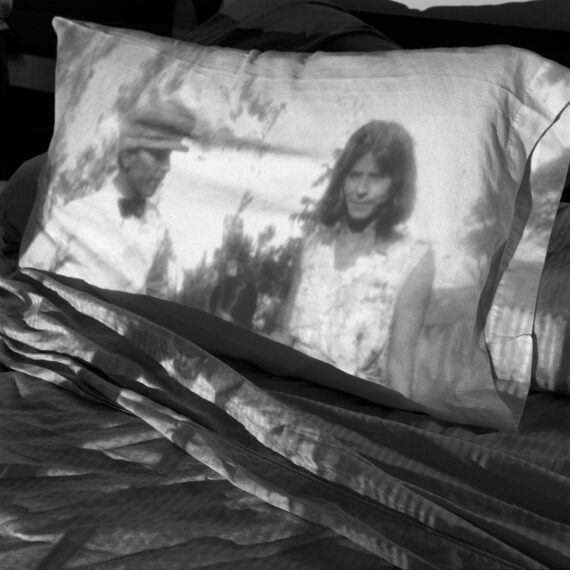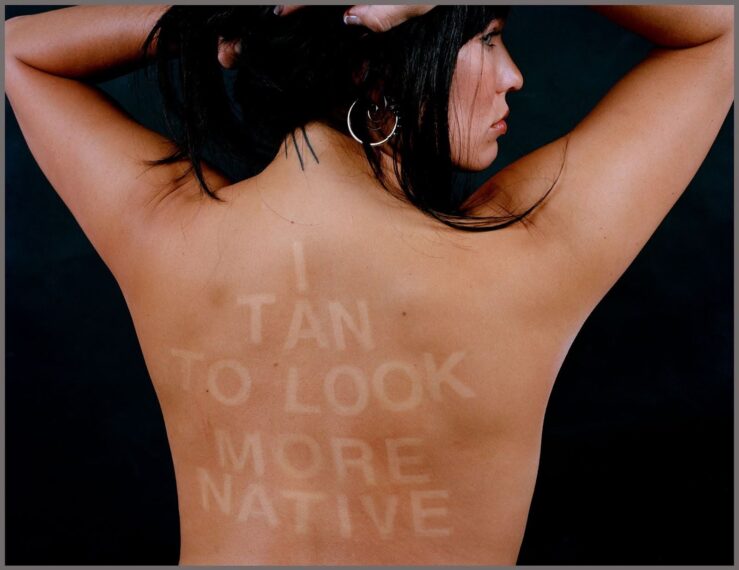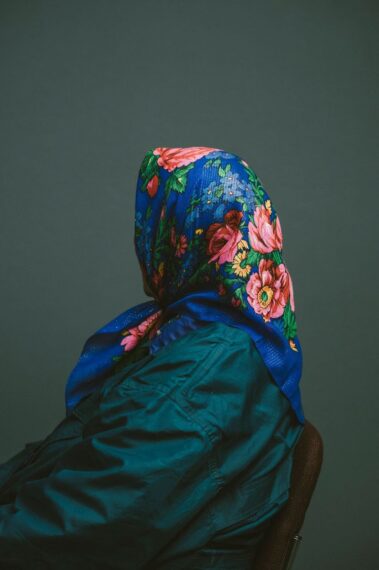
Photo Study Picks: Native American Heritage at Mia
By Casey Riley
October 24, 2025—Photo Study Picks is a series of monthly dispatches from Mia’s Photography Study Room, where individuals, groups, and classes can explore photographs from our permanent collection by appointment.
Everyone’s welcome, whether you’re conducting research or seeking creative inspiration. You can make an appointment through our online appointment form. Please schedule your appointment at least two weeks in advance. We look forward to welcoming you!
In this first edition of Photo Study Picks, we’re taking a look at a striking selection of works in Mia’s collection by Native American artists.

Mercedes Dorame (American, born 1980), My Ancestors Always Here, 2008, gelatin silver print. The Susan Jacobsen Endowment for Art Acquisition, 2024.17
In Mercedes Dorame’s evocative image of familial bonds, the spectral figures of two unnamed relatives illuminate the soft expanse of a bed pillow. The figure at the left gazes at the young woman to the right, who turns her own gaze to the viewer. In this space of rest and dreaming, Dorame imagines communication with her ancestors as accessible, inviting, and restorative rather than haunting.
As an artist of Tongva descent—a tribe she describes as having no “federal recognition, and therefore no reservation land and no gathering space”—Dorame gathers her relatives within intimate, domestic realms to honor their legacies and ongoing presence upon the land.

Erica Lord (American, Athabascan, born 1978), Untitled (I Tan to Look More Native), 2006 (printed 2023), inkjet print. The Patricia and Peter Frechette Endowment for Art Acquisition, 2024.21
In her provocative, four-image Tanning Project series, mixed-race Native Alaskan artist Erica Lord disrupts colonial narratives through pose and gesture. By transferring phrases such as “Indian Looking” and “Colonize Me” onto her body to be revealed post-tanning, Lord challenges assimilationist ideals and white settler notions of racial hierarchy.
Lord’s photographic performances upend time, opposing the false binaries of the “historical” Native American and the “futuristic” mixed-race woman. This two-fold inscription, both text and tan, externalizes the complexity of Indigenous identity.

Pat Kane (Canadian, born 1979), Maryann Mantla, Gameti, 2017 (printed 2023), inkjet print. The Alpha Gustafson Endowment, 2024.19
While sitting for her portrait, Maryann Mantla turned around to allow photographer Pat Kane to admire her floral head scarf and deep teal dress. When she did, Kane created something visually striking and ethically profound: a work neither planned nor staged and yet beautifully composed, embodying the reciprocity and respect with which he practices photography.
In some Native nations, photographs are seen as animate, having a life that continues to connect the person, the image, and the viewer. Because of this, great care and respect must be given to the sitter and the photograph itself.
Through this collaboration between photographer and sitter, a new kind of portrait emerges—one that honors the agency and decision-making to which Mantla is entitled. Kane’s portrait of Mantla enacts the principles of visual sovereignty, which hold the right of self-representation within Indigenous people.
About Casey Riley, Chair of Global Contemporary Art and Curator of Photography and New Media

Casey Riley oversees Mia’s Department of Global Contemporary Art and the research, exhibition, and publication of the museum’s renowned collection of art after 1970. Her curatorial practices are rooted in collaboration and informed by the principles of inclusion and equity. Recent projects at Mia include “Objectivity: Metaphorical and Material Lives of Photographs,” “Dayanita Singh: Pothi Khana,” “Hindsight: American Documentary Photography 1930–1950,” “Vision 2020: Jess Dugan,” “Just Kids,” and “Strong Women, Full of Love: The Photography of Meadow Muska.”
Riley was the assistant curator at the Boston Athenaeum and consulting curator at the Isabella Stewart Gardner Museum. She’s published widely on American art and photographic history, and has most recently co-organized, with Frank Goodyear and Lisa Hostetler, Marcia Resnick: As It Is or Could Be, the catalogue that received the 2022 Photography Network Book Prize. An experienced educator, Riley is a graduate of Yale University, holds master’s degrees from Brown University and Middlebury College, and earned her PhD from Boston University. She’s a member of the 2023 class of fellows at the Center for Curatorial Leadership in New York City.
Meet the other curators in the Department of Global Contemporary Art.
